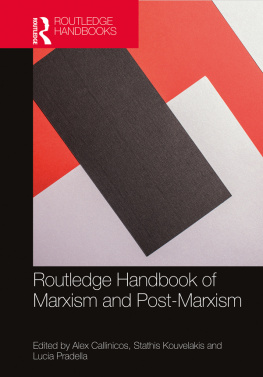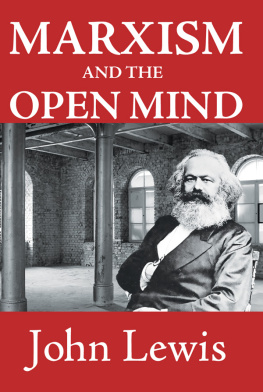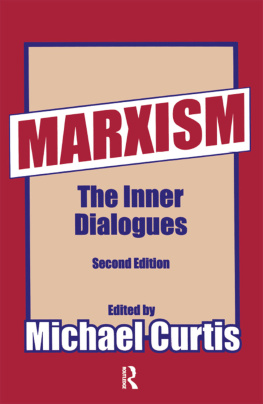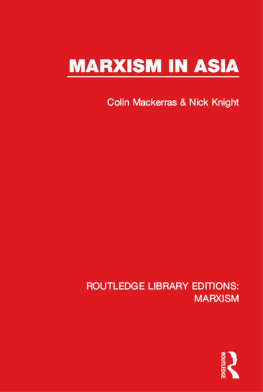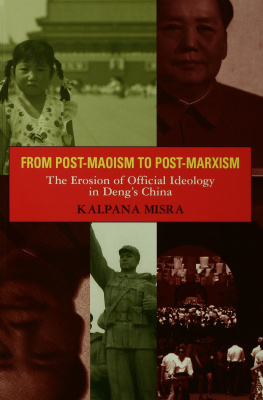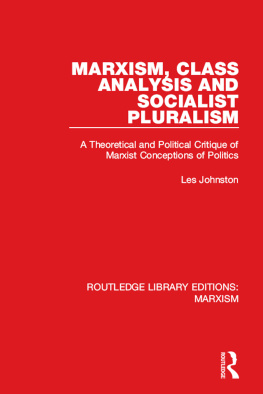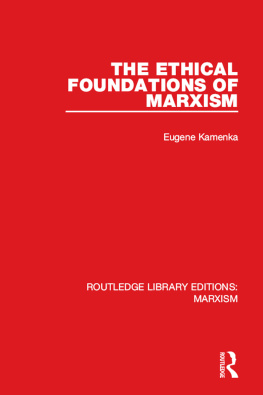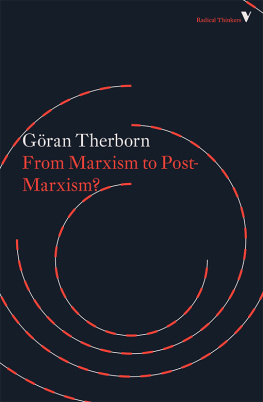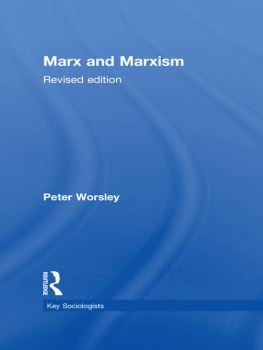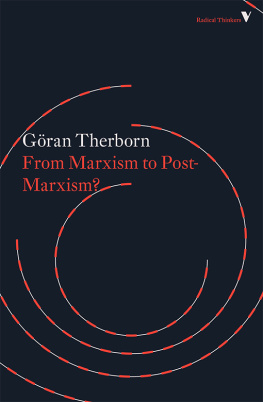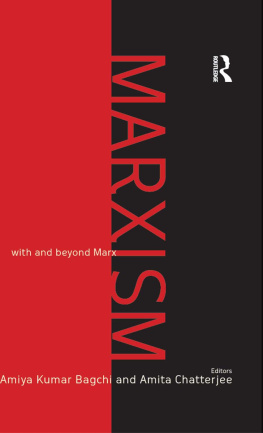Alex Callinicos - Routledge Handbook of Marxism and Post-Marxism
Here you can read online Alex Callinicos - Routledge Handbook of Marxism and Post-Marxism full text of the book (entire story) in english for free. Download pdf and epub, get meaning, cover and reviews about this ebook. year: 2021, publisher: Taylor & Francis (Unlimited), genre: Politics. Description of the work, (preface) as well as reviews are available. Best literature library LitArk.com created for fans of good reading and offers a wide selection of genres:
Romance novel
Science fiction
Adventure
Detective
Science
History
Home and family
Prose
Art
Politics
Computer
Non-fiction
Religion
Business
Children
Humor
Choose a favorite category and find really read worthwhile books. Enjoy immersion in the world of imagination, feel the emotions of the characters or learn something new for yourself, make an fascinating discovery.
- Book:Routledge Handbook of Marxism and Post-Marxism
- Author:
- Publisher:Taylor & Francis (Unlimited)
- Genre:
- Year:2021
- Rating:5 / 5
- Favourites:Add to favourites
- Your mark:
- 100
- 1
- 2
- 3
- 4
- 5
Routledge Handbook of Marxism and Post-Marxism: summary, description and annotation
We offer to read an annotation, description, summary or preface (depends on what the author of the book "Routledge Handbook of Marxism and Post-Marxism" wrote himself). If you haven't found the necessary information about the book — write in the comments, we will try to find it.
Routledge Handbook of Marxism and Post-Marxism — read online for free the complete book (whole text) full work
Below is the text of the book, divided by pages. System saving the place of the last page read, allows you to conveniently read the book "Routledge Handbook of Marxism and Post-Marxism" online for free, without having to search again every time where you left off. Put a bookmark, and you can go to the page where you finished reading at any time.
Font size:
Interval:
Bookmark:

FOUNDATION: KARL MARX (181883)
Lucia Pradella
The history of Marxism is studded with attempts to go back to its foundations. Since Marx sees capital as a system that constantly recreates its own foundation, it is no wonder that his critique of political economy has become an inexhaustible source of answers to what seem to be the new questions of the present.
One of such questions concerns the idea of globality. Did Marx develop a critique of capitalism as a global system? And does he provide us with tools for opposing imperialism, racism and gender oppression today? The prevalent answer within contemporary Marxist and Post-Marxist debates is that, despite its global potential, Marxs critique of political economy did not ascend to the level of the world market, and thus failed to overcome Eurocentrism and fully to recognize the agency of non-Western people (Chaturvedi 2010). While postcolonial scholars like Edward Said (1985), Gayatri Spivak (1999) and Dipesh Chakrabarty (2007) recognize emancipatory elements in Marxs work his intuition of globality (see Spivak in this Handbook) Marxist historical sociologists like the late Giovanni Arrighi (2007) and Andre Gunder Frank (1998) were more dismissive, up to the point of the latter denouncing Marx as a complicit supporter of Western imperialism.
If we read some passages from the Manifesto we could think that these criticisms are correct. How else can we judge Marx and Engels praising the role of the bourgeoisie drawing even the most barbarian nations into civilization, or Engelss view of Slavic peoples as people without history? A new body of Marxist scholarship seeks to differentiate this early Marx from a non-Eurocentric late Marx (e.g., Anderson 2010). Especially from the late 1850s, they argue, Marx broke away from the Eurocentrism of The German Ideology and The Manifesto, and supported anti-colonial movements in India and Ireland, and the emancipation of the slaves in the United States and Russia. This interpretation draws on writings that have been largely overlooked in many postcolonial and Marxist debates, including Marxs and Engelss notebooks published in the new historical-critical edition of their complete writings (the Marx-Engels Gesamtausgabe, MEGA2). But it raises two main questions, concerning, respectively, the status of historical materialism and the critique of political economy. Are the founding texts of the Marxist tradition irremediably Eurocentric? And did Marx break with Eurocentrism only in his late political writings or in his overall critique of political economy?
These questions are linked to a second area of debate between Marxist, postcolonial and feminist scholars, concerning the relevance of Marx for conceptualizing gender relations. It is widely assumed that womens work is the blind spot of Marxs critique of political economy (Werlhof 1988; Mies 1998). Marxs Capital would not address the antagonism between capital and reproductive labor but would be mainly concerned with abstract labor, labor-power in the form in which it is useful to capital. This narrow focus on exploitation would close off the analysis of spaces of resistance (Bhattacharya 2017; Lebowitz 2003). We would thus need to expand our understanding of anti-capitalist struggles beyond the traditional Marxist canon. Not just struggles between labor and capital at the point of production for Nancy Fraser (2014, 71) but also boundary struggles over gender domination, ecology, imperialism and democracy. This view resonates with David Harveys (2017, 48) recent argument that we need to shift our focus from struggles at the point of valorization to those at the point of realization, which trigger fights against predatory practices and accumulation by dispossession in the market place (e.g. against gentrification and foreclosures). But what if it is the traditional struggle between wage labor and capital that has been insufficiently theorized or even understood?
This entry seeks to answer these questions by going back, again, to the foundations. It investigates what Engels deemed to be Marxs two main discoveries: the materialist conception of history and the theory of surplus value. As is well-known, the first inaugurated a new way of looking at history that shifted the focus from politics, religion, science and art onto the relations of production and reproduction of social life. Despite the limited results of Marxs and Engelss concrete application of this approach in the mid-1840s, in the next section I argue that the lifelong research program they inaugurated then laid the basis for overcoming the problem of Eurocentrism. This point is relevant fully to grasp the scope of Marxs theory of surplus value. By explaining how the exploitation of labor works within capitalism, for Marx, the theory of surplus value was the pivot of his critique of political economy (C I: 132), the Cartesian point that revolutionizes our understanding of capitalism as a global system. In the third section, I challenge narrow interpretations of the antagonism between wage labor and capital, and argue that, for Marx, this antagonism shapes the overall relationship between humankind and nature. His analysis of capitalist reproduction, I argue in the fifth and sixth sections, provides us with tools for conceptualizing the imperialist and gendered nature of processes of capital accumulation on a global scale. These aspects of Marxs work, I conclude, are crucial to thinking about the class struggle, both yesterday and today.
In the collection of manuscripts that then became the founding text of historical materialism, The German Ideology, Marx and Engels sought to settle accounts with [their] former philosophical conscience (MECW 29: 264). Through different paths, they came to recognize both the centrality of production relations and the validity of the labor theory of value. Marxs and Engelss personal trajectories reflect broader historical and intellectual developments. As Ronald Meek (1976) highlighted, the materialistic approach to history was elaborated within the Scottish Enlightenment alongside the labor theory of value. The revolution in production relations from the late 18th century onwards pushed the theorists of the French and Scottish Enlightenment to understand the impact of different modes of subsistence on human societies. By looking at capitalism (or commercial society) as a specific mode of subsistence among others, classical political economists like Adam Smith and David Ricardo were able to conceptualize its historical specificity. They thus grasped the role of labor in determining the value of commodities and the importance of class antagonisms in history. Because of their own class interests, however, classical economists did not push this analysis further and ended up naturalizing bourgeois relations, smuggling them in as the inviolable natural laws of society in the abstract (G: 87). Europe appeared as the telos and endpoint of historical progress, in a teleological framework that deeply informs also Hegels philosophy of history (Pradella 2015).
Even when Marx embraced Ludwig Feuerbachs attempt to put Hegel on his feet, he did so in a way that was deeply influenced by Hegels critique of immediacy. Marx did not take as his starting point the human essence as revealed in sense-experience, as Feuerbach suggested: such human essence, Marx believed, is created through labor and our sense-experience is mediated by the totality of social relations. While Marx initially grounded his analysis of capitalist social relations in his critique of the alienation of workers from their activity and species being (
Font size:
Interval:
Bookmark:
Similar books «Routledge Handbook of Marxism and Post-Marxism»
Look at similar books to Routledge Handbook of Marxism and Post-Marxism. We have selected literature similar in name and meaning in the hope of providing readers with more options to find new, interesting, not yet read works.
Discussion, reviews of the book Routledge Handbook of Marxism and Post-Marxism and just readers' own opinions. Leave your comments, write what you think about the work, its meaning or the main characters. Specify what exactly you liked and what you didn't like, and why you think so.

